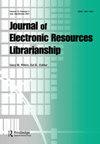Review of Article Galaxy Scholar
Q3 Social Sciences
Journal of Electronic Resources Librarianship
Pub Date : 2023-07-03
DOI:10.1080/1941126X.2023.2225018
引用次数: 0
Abstract
really necessary? I believe that scite offers some compelling features that can make it competitive and attractive for both libraries and end users. The browser extension, Zotero plugin, and API make it easier than some tools to integrate into the research environment. It is highly customizable for individual users (some functionality requires a personal account, even with an institutional subscription), and accessible end-user pricing puts the tool in the reach of users for whom Web of Science or Scopus is not a viable option. It is intuitive and easy to use, where Web of Science is often complex and fussy. And its open (unpaywalled) interface makes it a prime candidate to be widely integrated into the online research landscape in way that other tools might never be. I also find scite promising in terms of being able to deliver on its chief claim: that it can save researchers time by helping them summarize the literature and quickly identify publications both valuable and discredited for their research. It is possible that Clarivate sees this as well, because, in the spring of 2022, Web of Science added a feature similar to scite’s “smart citations” to its interface (though it is not yet available for every item). Called “Citing Items Breakdown,” it classifies citations as background, basis, support, differ, and discuss and will show snippets from the paper that include the text of the citation. Some might worry that a tool like scite could oversimplify the research process, exacerbate blind spots and encourage students to use shortcuts to doing their own research. While all of this may be true, there are any number of other tools or practices that can contribute to these outcomes already. Textbooks summarize previously conducted research and present it in a form most likely to be digestible to a particular audience. Discovery layers collapse indexing and deliver broader search results with less precision. Faculty at my institution ranked Google Scholar, the ultimate research shortcut, as the most-popular place to start their research in a recent survey here. In discussing their citation classification model, scite’s creators emphasize that “scite supplements machine learning with human interventions.” This is a metaphor for what is necessary for conducting quality research in order to produce new knowledge, no matter what tool is being used. I think scite offers attractive features for students and researchers and can augment the discovery experience for academic libraries. I have already heard of one instance where a user asked for it by name at our reference desk; I would not be surprised to hear of this happening more in the future.《银河学者》文章综述
真的有必要吗?我相信scite提供了一些引人注目的功能,这些功能可以使它对图书馆和最终用户都具有竞争力和吸引力。浏览器扩展、Zotero插件和API使其比一些工具更容易集成到研究环境中。它对个人用户具有高度的可定制性(有些功能需要个人帐户,即使是机构订阅),可访问的最终用户定价将该工具放在科学网或Scopus不可行的用户手中。它直观易用,而Web of Science往往是复杂而繁琐的。它的开放(非屏蔽)界面使它成为广泛融入在线研究领域的主要候选工具,而其他工具可能永远不会这样做。我还发现scite在能够实现其主要主张方面很有希望:它可以帮助研究人员总结文献,并快速确定对其研究有价值和不可信的出版物,从而节省研究人员的时间。Clarivate可能也看到了这一点,因为在2022年春天,Web of Science在其界面上添加了一个类似于scite“智能引文”的功能(尽管它还不能用于所有项目)。它被称为“引用项目分解”,将引用分为背景、基础、支持、不同和讨论,并将显示论文中包括引用文本的片段。有些人可能担心,像scite这样的工具可能会过于简化研究过程,加剧盲点,并鼓励学生使用捷径进行自己的研究。虽然所有这些都可能是真的,但已经有许多其他工具或实践可以为这些结果做出贡献。教科书总结了以前进行的研究,并以最容易被特定受众理解的形式呈现。发现层折叠索引,并以较低的精度提供更广泛的搜索结果。在最近的一项调查中,我所在机构的教员将谷歌学者(Google Scholar)列为最受欢迎的研究起点。在讨论他们的引文分类模型时,scite的创建者强调,“scite用人类干预来补充机器学习。”这是对进行高质量研究以产生新知识所必需的东西的隐喻,无论使用什么工具。我认为scite为学生和研究人员提供了有吸引力的功能,可以增强学术图书馆的发现体验。我已经听说过一个例子,一个用户在我们的咨询台上指名索要;如果将来听到这种情况发生得更多,我不会感到惊讶。
本文章由计算机程序翻译,如有差异,请以英文原文为准。
求助全文
约1分钟内获得全文
求助全文
来源期刊

Journal of Electronic Resources Librarianship
Social Sciences-Library and Information Sciences
CiteScore
1.50
自引率
0.00%
发文量
46
期刊介绍:
A journal for information professionals who work with managing electronic resources in libraries The Journal of Electronic Resources Librarianship (renamed from The Acquisitions Librarian to reflect the journal"s broader focus) provides a much-needed scholarly forum for librarians and other information professionals. This peer-reviewed quarterly journal addresses evolving work-related processes and procedure, current research, and the latest news on topics related to electronic resources and the digital environment"s impact on collecting, acquiring, and making accessible library materials. The journal provides opinion pieces, the latest news, book reviews, conference presentations, and e-resources related updates.
 求助内容:
求助内容: 应助结果提醒方式:
应助结果提醒方式:


